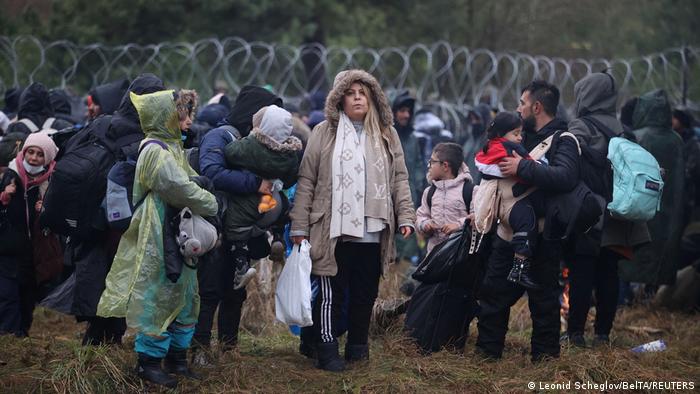
Polish officials closed the crossing with Belarus at the border town of Kuznica on Tuesday morning, a day after thousands of migrants arrived in the area seeking to cross into the EU.
Poland's Prime Minister Mateusz Morawiecki described the incident as a "hybrid attack" conducted by the regime of Belarus President Alexander Lukashenko.
"Sealing the Polish border is our national interest. But today the stability and security of the entire EU is at stake," Morawiecki wrote on Twitter.
"We will not be intimidated and will defend peace in Europe with our partners from NATO and EU."
The EU claims Lukashenko is attracting migrants from the Middle East to Belarus with special visas and taking them to the border with EU and NATO members Poland and Lithuania.
What has Poland said?
Polish President Andrzej Duda said about 1,000 people, "mostly young men" are camped out on the Belarusian side of the border.
"The Belarusian regime is attacking the Polish border, the EU, in an unparalleled manner," he said. "These are aggressive actions that we must repel, fulfilling our obligations as a member of the European Union."
A spokesman for Poland's security services, Stanislaw Zarin, also accused Belarus security forces of "firing empty shots into the air" and helping migrants attack the barrier.
"We see how they bring them tools to cut wires... to destroy the fence."
DW correspondent in Poland, Magdalena Gwozd-Pallokat, said the situation was "getting explosive" with both Poland and Belarus amassing troops at the border and unconfirmed reports of people from Belarus seen on the Polish side of the border.
Polish border troops have already warned they would "use any necessary means they can if there is such a need," she said.
What is the response from Belarus?
Belarus denied the Polish accusations, labeling them as "unfounded and unsubstantiated," and claimed Warsaw was deliberately escalating tensions.
"We would like to warn the Polish side in advance against any provocations directed at the Republic of Belarus to justify any illegal use of force against unarmed people in need, including many women and minors," it said.
Border officials also said Poland was deploying military equipment and blocking aid workers from accessing the area.
They added Poland had no legitimate reason to close down the border crossing, saying that the decision might have been made so that the Polish side can "eliminate video footage from bystanders" and hide potential use of force or weapons against the migrants.
What is the current situation at the Poland-Belarus border?
Hundreds of migrants are believed to still be near the border on Tuesday, with videos showing tents and fireplaces on the Belarusian side. The Polish Interior Ministry said the night was quiet, save for a rock being thrown at a police car.
Videos from the scene on Monday showed a large group of migrants attempting to breach the border. Polish border guards and military claim Belarus troops were controlling and directing the group.
Polish government spokesman Piotr Muller told reporters that another 3,000 to 4,000 migrants were massing in the area.
"We expect that there may be an escalation of this type of action on the Polish border in the near future, which will be of an armed nature," he added.
Russia urged all sides to act responsibly, with the Kremlin spokesman Dmitry Peskov saying that Moscow was watching the situation "very closely."
The first priority, according to Peskov, are "the lives and health of this large number of people gathered at the border."
How have Germany and the EU reacted?
Responding to the crisis, the EU Council said it was suspending part of a visa facilitation agreement affecting Belarusian officials.
"This decision will not affect ordinary citizens of Belarus, who will continue to enjoy the same benefits under the visa facilitation agreement as they do currently," they said in a statement.
"It is unacceptable for Belarus to play with people's lives for political purposes," said EU Council representative Ales Hojs.
Separately, the European Commission said Belarus was using "gangster-style" tactics to funnel migrants to the EU.
"The citizens of these countries (in the Middle East and elsewhere) are being misused, are being made victims by state-sponsored activities," a Commission spokesperson told a briefing, warning that more sanctions against Belarus were coming.
On Tuesday, Germany's outgoing Interior Minister Horst Seehofer called on EU countries to "stand together" and accused Lukashenko and his Russian ally Vladimir Putin of trying to destabilize the West.
"The Poles have reacted correctly so far,'' Seehofer told German mass-circulation daily Bild. "We cannot criticize them for securing the EU's external border with admissible means. The Poles are fulfilling a very important service for the whole of Europe.''
So far, the Polish authorities have refused the offers of additional assistance from the EU.
The Lithuanian government has proposed introducing a state of emergency at the border region which would start on midnight, pending approval by the country's parliament.